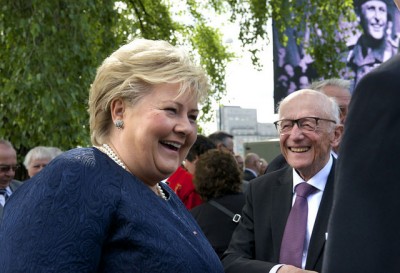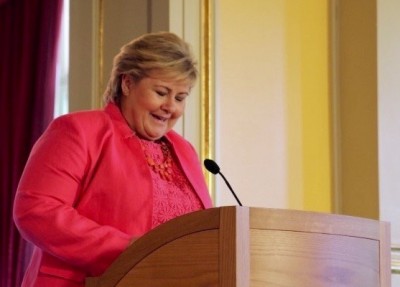Prime Minister Erna Solberg summed up the past year of her Conservatives-led government before heading into summer modus this week, and predictably emphasized progress over conflict. Even her arch rivals in the Parliament conceded afterwards that Solberg’s long list of reforms are well underway, and have launched a swing to the right that may be difficult for them to reverse.

“Norway can’t be changed overnight even with a political shift, but the effect of many of (the Solberg government’s) changes will leave a lasting impression for Norway,” Labour Party leader Jonas Gahr Støre told newspaper Aftenposten on Thursday. “In some of these areas, the toothpaste is out of the tube.”
Støre, who ranks as Solberg’s chief political opponent and keen to take over her job as prime minister, offered one example: “When you take money from the public high schools to start private, that’s not something that can easily be changed if the majority in Parliament shifts.”
Solberg’s minority government coalition with the even more conservative Progress Party, backed by their so-called Liberal and Christian Democrats “support parties,” quickly introduced new initiatives for reforms after winning the last national election in 2013. Now, midway through their first four-year term, their projects aimed at tax reform, agricultural reform, police reform, transportation reform, municipal government reform, health reform and high school reform are gaining steam or already falling into place.
Inheritance taxes were eliminated after just a few months in office, for example, and Norway’s controversial formueskatt (annual tax on net worth) has been reduced. Ketil Solvik-Olsen from the Progress Party was recently dubbed the best and most effective transport minister in decades, after clearing the way for major highway and railroad investment. Even his party colleague Sylvi Listhaug, dreaded by farmers when she took over as agriculture minister, has managed to push through structural reform, innovation in sales and export of unique Norwegian farm products and a new state support deal that won backing from Norway’s biggest farm lobby. The former left-center government often saw state negotiations with the powerful farmers break off, even when their biggest supporter, the Center Party, was in office.

Solberg could also rattle off accomplishments such as major reform and streamlining of the state police, mergers of local governments to cut bureaucracy and boost efficiency and more state-funded health care options for patients. None of those is likely to be reversed by a new Labour-led government, according to political commentators. The transportation reforms and investment are the most popular with the public, and are aimed at ending years of delays and inflated costs at getting, for example, highway and railway improvements completed.
Solberg could also claim victory in efforts to make it easier for employers to hire part-time workers. She was proud of moves allocating NOK 144 million to aid children in relatively low-income families, introducing a new maritime strategy to get more Norwegian flags on ships and reducing the overall income tax rate from 28- to 27 percent. Her government is also pushing for diversification of Norway’s economy to make it less reliant on its major oil and gas industry. Its revised state budget all but sailed through Parliament earlier this month.
Riding out storms
Solberg’s government has, without question, been rocked by conflict, not least between the Progress Party and the Christian Democrats on such thorny issues as immigration and acceptance of refugees. Her justice minister from the Progress Party, Anders Anundsen, has faced harsh criticism on several issues and both her party and the Progress Party have fallen in public opinion polls. That’s not unusual, though, and Solberg has mostly kept calm and carried on.
Many politicians in Parliament have complained that the Progress Party presents two faces, one as a responsible member of the government and another that makes it still seem like an opposition party in Parliament. Some particulary loud Progress Party MPs are often seen as stirring up trouble for their own government by openly flaunting positions that are quite different from what the coalition has agreed. Solberg remained unruffled.
“I see a clear Progress Party profile every day,” Solberg told reporters. “Discussions that take place when you sit in the government together can differ from those in the Parliament There’s nothing new in flagging your primary viewpoints when there’s a discussion going on.”
New evaluations in 2017
With municipal elections looming this fall, political debate is likely to sharpen, but the left side of Norwegian politics won’t have a clear chance to win back state government power until the next national elections in 2017. Labour Party leader Støre told Aftenposten that “many people meet me with questions about what we will reverse. We’ll have to evaluate that in 2017 and see whether reversal is the answer, or whether it’s development in another direction that’s needed.”
Audun Lysbakken, leader of Labour’s more left-wing former government partner the Social Left party (SV), was tougher in his assessment of Solberg’s reforms that he claims “transfer responsibility from the collective good to the market.” He’s already eager to reverse moves at centralization and privatization, but with indications of voter support recently that barely are enough to win representation in Parliament it remains questionable whether he’ll get the chance.
newsinenglish.no/Nina Berglund

